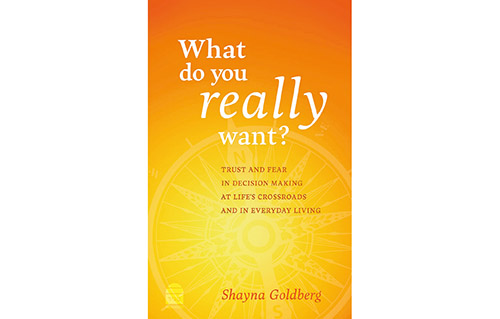
Reviewing: “What Do You Really Want?” by Shayna Goldeberg. Maggid Books. 2021. English. Hardcover. 180 pages. ISBN-13: 978-1592645718.
Shayna Goldberg has had hundreds of conversations with students and young adults throughout her career as an educator, counselor and yoetzet halacha. Most of the conversations have revolved around decisions they were struggling with in their lives, from questions about what they should study next in the beit midrash, to what career path they should take, to whether they should continue dating the person they are with. She decided to put her knowledge and experiences into writing, with the aim of helping empower readers to make decisions out of trust, rather than fear, and to take responsibility for their choices.
“What Do You Really Want?,” published by Koren Publishers Jerusalem in 2021, is Goldberg’s first book. The book opens by laying out what drives fear and trust and what the elements are of good decision making. It continues with different real-life stories involving decision making, from mundane acts such as choosing what type of coffee to order to major decisions about career, marriage and divorce, aliyah and relocation, among others. The next section is a “how to” for applying these decision-making approaches into everyday living, and the last part deals with moving forward and taking ownership of the decisions we have already made.
While serving as an educator at Ma’aynot High School and then as a yoetzet halacha and mashgiach ruchanit at Stella K. Abraham Beit Midrash for Women in Migdal Oz, when Goldberg was approached by her students and other young adults, she often questioned what her role should be in these conversations. Over time she realized that it is not her responsibility to make decisions for those seeking her counsel, but to listen intently and guide them to help them figure out what they want for themselves. “I deeply believe in autonomy, and I believe that as a parent and as an educator, our job is to help people become independent,” she explained. She came to understand that the key is about helping others to understand whether they are coming from a place of trust or fear, and to follow the path that they are drawn to, not out of fear but out of trust.
Goldberg explains that in addition to the many conversations she has had with young adults, her decision-making philosophy was inspired by her upbringing in Great Neck, as well as by an article she read more than three decades ago. As the daughter of community leaders who served as the rabbi and rebbetzin of Young Israel of Great Neck for 45 years, Goldberg was exposed to a very diverse group of people in her parents’ community, including many whose lifestyle was different from her own. Nonetheless, her parents instilled in her the principle of trust—to trust her values and way of life and to also trust those who are different and appreciate their good deeds and kindness. From a young age, Goldberg had a very foundation of trust in her life.
Shortly after Goldberg got married, her husband shared an article written by Dr. Mordechai Breuer about the educational philosophy of his great grandfather Rabbi Samson Raphael Hirsch. One line particularly resonated deeply with her: “In education, let ourselves be guided by trust and truth, not by fear.” Goldberg understood from this sentence, which contrasted trust from fear, that it is fear that often gets in the way of decision making and prevents us from trusting our own instincts.
Goldberg says that she often practices the approaches outlined in her book. After she got married, she and her husband made a plan to make aliyah after he finished residency, but they decided to postpone it by one year so that they could arrive in Israel in a better financial situation. This was a major decision that she and her husband had to make, and she remembers that much of her decision making was grounded in fear—fear about what their friends would say when they found out that the young couple did not follow through with their plans and the fear over the shame that they would experience. But she looked deeply into herself to understand what she really wanted, and trusted her gut that pushing off the move was the best choice they could make at that point in time. Looking back, Goldberg says that this was indeed a very good decision.
Though the target audience of this book is young adults between 18 and 30 years of age, Goldberg insists that this book is “relevant for everybody,” including parents who are guiding children through difficult decisions. And though individuals of all faiths and backgrounds can find helpful insights in this book, many of the stories deal specifically with the Jewish community and questions of faith.
The book opens with the well-known quote from Rabbi Nachman of Breslov: “Kol haolam kulo gesher tzar meod,” “The whole wide world is a very narrow bridge.” It is true that the world often feels like a dangerous and risky place and that fear can often stand in the way of what we know is “true and necessary,” in Goldberg’s words. Her hope is that her book will help empower readers to make the decisions they really want to make, which will result in greater satisfaction and happiness.
Alisa Bodner is a Fair Lawn native who immigrated to Israel a decade ago. She is a nonprofit management professional who enjoys writing in her free time.











